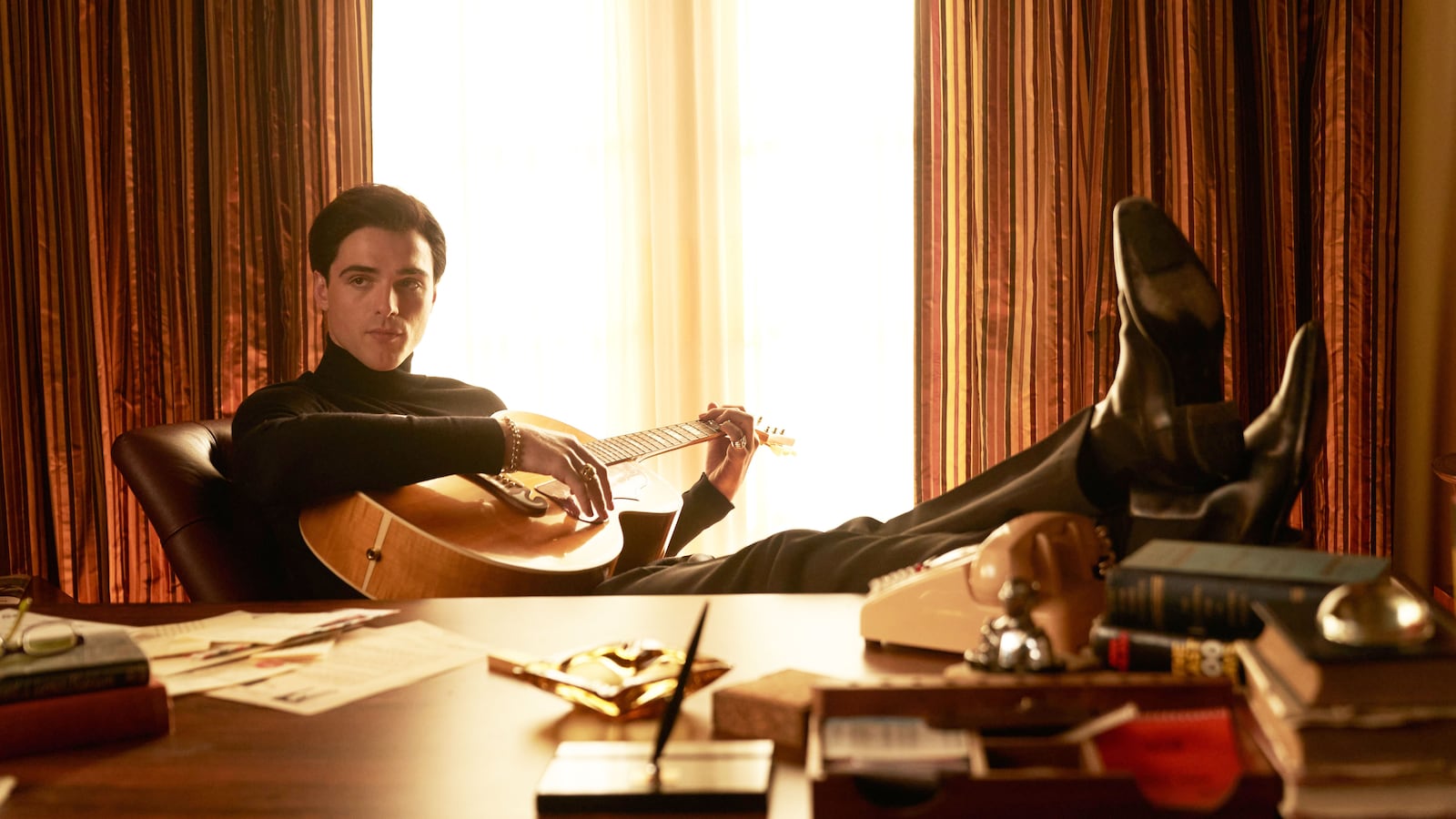In an era where young celebrities are overexposed or too thoroughly media-trained to be interesting, Jacob Elordi has become a surprising object of fascination and debate in pop culture. Does this blandly handsome man have sex appeal, or is he just tall and Australian? (The answer is yes.) Is he a pretentious film snob, or is his desire to be taken seriously after The Kissing Booth trilogy warranted? Did he have a legitimate crush on Brad Pitt as a kid, or is he queerbaiting the public? Is he a talented actor or another Hollywood hack?
The last question has, once again, become relevant upon the release of his next big projects: Sofia Coppola’s Priscilla, in wide release Friday, and Emerald Fernell’s Saltburn, due later this month. Predictably, though, his role in Fennell’s film is generating a little less conversation (see what I did there?) than his take on Elvis Presley in Priscilla. A snippet of his performance as Elvis, ahead of the film’s release this week, has already earned Elordi praise on social media and comparisons to Austin Butler’s award-winning role in Baz Luhrmann’s Elvis last year. If anyone had any guts, he’d be receiving some Oscar buzz too.
In Coppola’s biopic of Priscilla Presley (née Beaulieu), Elordi portrays the King of Rock ’n’ Roll during the downslope of his chart-topping career, following his return to the U.S. after serving in the army. The story, based on Priscilla’s 1985 memoir Elvis and Me, picks up when Priscilla (Cailee Spaeny) is invited to one of Elvis’ parties in Germany, where the then 14-year-old is residing with her military family. From there, the two embark on a complicated romance that has since been glamorized in Hollywood and pop-music mythology. Coppola demystifies that supposed “fairy tale,” shedding a light on the controlling, predatory side of Elvis and their disturbing age gap.
That said, the portrayal of the rock ’n’ roll icon, who provides a theatrical element to an austere movie, really makes or breaks Coppola’s film. Such a flashy figure, who’s become a go-to comedic impression, doesn’t seem like a natural fit for Coppola’s muted, pastel-colored world. But Elordi’s believable performance makes Priscilla—no pun intended—sing. Coppola does a great job of adapting Priscilla’s troubling dynamic about her ex-husband to screen. But Elordi rises to the occasion of the script, embodying both the spectacular and pathetically human parts of him.

There’s a melancholy and desperation that underlies Elordi’s layered performance that eludes it from feeling solely like a good impersonation. (Although his terrific accent work should be noted.) There’s a James Dean-esque fragility to his take on Elvis that’s both devastating and infuriating when it’s used against Priscilla. In the musician's most obnoxious moments, like when he’s reading Bible scriptures to his spouse in bed, he’s absolutely hysterical.
Watching his casual cruelty crescendo over the course of 110 minutes reminded me of Michael Shannon’s depiction of the equally problematic country singer George Jones in Showtime’s George and Tammy. (This is a comparison I never thought I would make!) Both icons’ personal demons—in the case of Elvis, his grief over the loss of his mother and disappointments about his fame—become justifications to suppress their romantic partners. Nevertheless, these actors make pretty insufferable people extremely captivating.
While Elordi takes up a lot of space on screen—and not just because the actor is freakishly tall—his performance is never too showboat-y (save for the moments when Elvis is purposely being showboat-y). I found myself perking up whenever he appeared. But at the same time, I was never distracted from the ultimate goal of Coppola’s project, which is to illuminate Priscilla’s coming-of-age under the thumb of a disastrous man.
By my estimation, most critics and Film Twitter folks agree—if not reluctantly—that Elordi’s Elvis is pretty impressive. There’s also the 26-year-old’s very online fanbase, which has been pitting him against Austin Butler and his method-acting approach to Elvis—before many of them have even seen Priscilla, I might add.
I can’t say I didn’t hesitate to call Elordi’s performance great at first, much like many other critics. Many of the reviews I’ve read focus on the unflattering version of Elvis he’s playing and not how well he plays him. Forecasters for awards season have mostly disregarded Elordi’s performance as well—and understandably so. When I saw Priscilla at its New York Film Festival premiere, my initial reaction to Elordi was that he exceeded my expectations. It was a good performance, I thought, for him—the man I had watched play an underwritten jock on Euphoria and receive a handjob from Ana de Armas in Deep Water. Almost a month later, I still can’t stop thinking about him towering over Priscilla, with a dangerous look on his face, muttering, “Why, you’re just a baby.”
Maybe Elordi will move up in the Oscar predictions rankings—it’s only September, after all, and who knows when awards season will actually start, given the SAG-AFTRA strike. Whether or not he picks up any hardware over the next year, Priscilla will mark the moment Elordi stopped being that blandly attractive white guy in terrible projects and became a formidable movie star.






